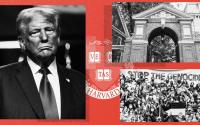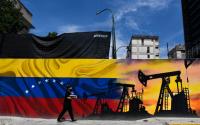8 June 2005Canoe NetworkBeth Gorham
The White House is fending off attacks that an official watered down reports on global warming just as British Prime Minister Tony Blair is trying to muster world support for a new push to fight climate change.
It's not the first time the U.S. administration has been charged with politicizing science and it hit a nerve with environmentalists who've long argued there's too much industry influence on American policy when it comes to greenhouse gas restrictions.
A story published in the New York Times on Wednesday revealed repeated changes to descriptions of climate research that had already been approved by government scientists and their supervisors.
Philip Cooney, chief of staff for the White House Council on Environmental Quality, edited several reports issued in 2002 and 2003 to cast doubt on whether greenhouse gases really cause global warming, the newspaper reported.
Cooney, a lawyer who once led the American Petroleum Institute's fight against greenhouse gas limits, joined the administration in 2001. He has no scientific training.
White House spokesman Scott McClellan called the participation of Cooney a normal part of the review process by some 15 agencies.
"Our reports are based on the best scientific knowledge," said McClellan. "There are a number of scientists involved in this."
Dr. John Marburger, director of the Office of Science and Technology, signs off on all the reports, he added.
The allegations surfaced after Blair met with little success this week when he tried to pitch President George W. Bush on a new emissions reduction push ahead of the Group of Eight meeting next month in Scotland.
Bush said he still needs to know more about the problem and pointed out that America leads the world on the amount of money spent researching the issue.
The U.S. president refused to sign on to the 1997 Kyoto treaty to lower greenhouse gas emissions and has challenged studies that say the pollutants cause global warming.
The Guardian newspaper of London reported Wednesday that Bush's objection to the treaty was partly the result of pressure from ExxonMobil, the world's most powerful oil company, and other industries.
U.S. State Department briefing papers obtained by the newspaper indicate the administration thanked Exxon executives for their "active involvement" in helping to determine climate change policy and sought advice on what policies they might find acceptable.
The company is spending millions of dollars on an advertising campaign to influence politicians, opinion leaders and business groups in pro-Kyoto countries in the runup to next month's Group of Eight summit in Gleneagles, Scotland.
Meanwhile, dozens of Cooney's changes, sometimes as small as inserting the phrase "significant and fundamental" before the word "uncertainties," produce an air of doubt about the causes of climate change when most experts agree there's a wealth of evidence, said the New York Times.
In one instance, Cooney added the word "extremely" to the sentence: "The attribution of the causes of biological and ecological changes to climate change or variability is extremely difficult."
Senate Democratic Leader Harry Reid said Cooney's changes are part of a government pattern that exhibits a "brazen disregard for sound science."
"By repeatedly editing government documents on global warming to cater to the special interests, the Bush administration has once again show that it will abuse power by any means necessary," said Reid.
In 2003, an Environmental Protection Agency report that was supposed to provide a comprehensive review of the risks of rising temperatures contained just a few general paragraphs.
In the end, there were no references to studies linking global warming with smokestack and tailpipe emissions, a costly headache for industries.
The memos edited by Cooney were provided to the newspaper by the Government Accountability Project, a non-profit group that helps whistleblowers.
The project is representing Rick Piltz, who resigned in March as a senior associate in the office that co-ordinates government climate research and issued the reports that Cooney edited.






